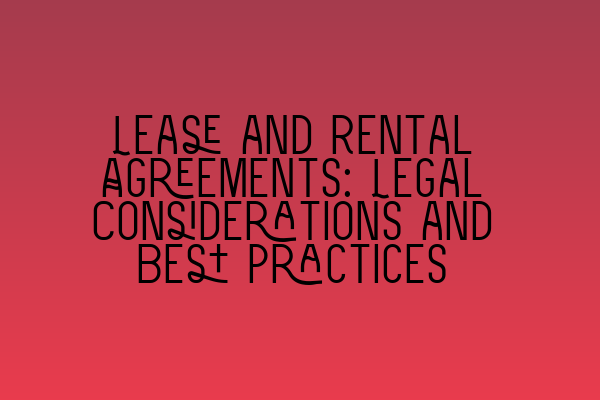Lease and Rental Agreements: Legal Considerations and Best Practices
Introduction:
Leasing and renting properties can be a complex process, with various legal considerations that both landlords and tenants must take into account. Understanding the intricacies of lease and rental agreements is essential to ensure that both parties are protected and their rights are upheld. In this blog post, we will discuss the legal aspects and best practices surrounding lease and rental agreements, providing a comprehensive guide for those involved in the property rental business.
1. Importance of a Written Agreement:
A written lease or rental agreement is crucial to establish the terms and conditions of the tenancy. It outlines the rights, responsibilities, and obligations of both the landlord and the tenant, providing clarity and protection for all parties involved. By having a written agreement, potential disputes can be avoided, and the expectations of both the landlord and tenant can be clearly defined.
2. Essential Elements of a Lease/Rental Agreement:
a. Names and contact information of both parties:
Including the full legal names and contact details of both the landlord and the tenant is essential for easy communication and identification.
b. Property details:
Clearly specifying the address and description of the property being leased or rented leaves no room for ambiguity or confusion.
c. Term of the tenancy:
Defining the length of the tenancy, whether it is on a month-to-month basis or a fixed term, is vital for both parties to understand their obligations and the duration of the agreement.
d. Rent payment details:
The agreement should clearly state the amount of rent, the due date, the acceptable payment methods, and any late payment penalties to ensure a smooth rent payment process.
e. Security deposit:
Specifying the amount of the security deposit, how it will be held, and the conditions for its return or deduction is crucial to protect the landlord’s interest while setting clear expectations for the tenant.
f. Maintenance and repair responsibilities:
Outlining which party is responsible for maintenance and repairs, and the process for reporting and addressing issues, ensures that the property is well-maintained and any problems are promptly resolved.
g. Use of the property:
Defining the permissible use of the property and any restrictions or limitations, such as prohibiting subleasing or commercial activities, helps maintain the desired environment and protects the landlord’s interests.
h. Termination and renewal provisions:
Detailing the conditions and procedures for terminating or renewing the agreement helps both parties plan ahead and minimizes confusion or disputes.
i. Governing law and dispute resolution:
Including a clause that specifies the governing law and the preferred method of dispute resolution, such as mediation or arbitration, can provide a roadmap for resolving conflicts in a fair and efficient manner.
3. Legal Considerations and Compliance:
a. Landlord and tenant rights and responsibilities:
Familiarize yourself with the legal rights and responsibilities of both landlords and tenants, as outlined in the applicable laws and regulations. Be aware of any local or state-specific requirements that must be adhered to.
b. Fair Housing Laws:
Ensure that your lease or rental agreement complies with fair housing laws, which prohibit discrimination based on factors such as race, color, religion, sex, national origin, familial status, and disability.
c. Health and safety regulations:
It is the landlord’s responsibility to maintain a safe and habitable living environment. Familiarize yourself with relevant health and safety regulations to ensure compliance.
d. Insurance:
Consider obtaining appropriate insurance coverage to protect yourself and your property against potential risks, such as liability claims or property damage.
4. Seek Professional Assistance:
Given the complexity of lease and rental agreements, it is advisable to seek the assistance of a qualified solicitor who specializes in property law. A solicitor can help ensure that your lease or rental agreement complies with all legal requirements and safeguards your interests.
Conclusion:
Understanding the legal considerations and best practices surrounding lease and rental agreements is crucial for landlords and tenants alike. By having a written agreement that covers essential elements, complying with legal requirements, and seeking professional assistance when needed, both parties can have a smooth and successful tenancy experience. Remember to stay informed about changes in relevant laws and regulations to ensure ongoing compliance and protection.
Related Articles:
– SQE 1 Practice Exam Questions
– SQE 1 Practice Mocks FLK1 FLK2
– SQE 2 Preparation Courses
– SQE 1 Preparation Courses
– SRA SQE Exam Dates
